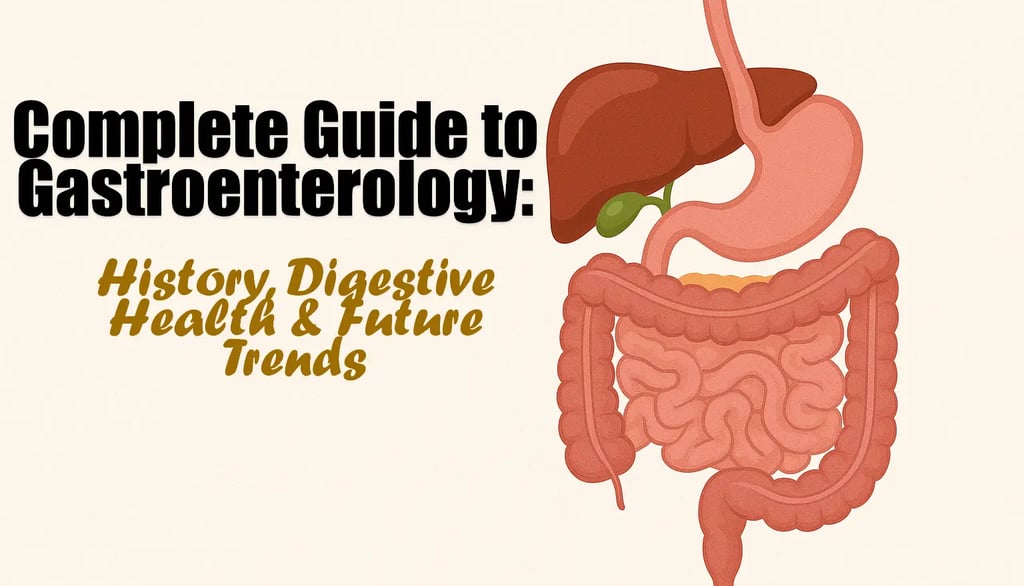A Complete Guide to Gastroenterology: History, Digestive Health & Future Trends
Learn the history of gastroenterology, the role of gastroenterologists, and the future of digestive health. Discover how the GI tract works and why early care matters.


A Complete Guide to Gastroenterology: History, Role, and Future of Digestive Health
Introduction
Gastroenterology is a vital branch of medicine that focuses on the digestive system and related disorders. From its early roots in ancient civilizations to today’s cutting-edge medical technologies, gastroenterology has played a central role in improving human health. This article explores the history of gastroenterology, the anatomy of the gastrointestinal tract, the role of gastroenterologists, and the future of digestive health.
A Brief History of Gastroenterology
The history of gastroenterology dates back to ancient Egypt and Greece, where early physicians studied digestive problems and experimented with herbal remedies. Hippocrates, known as the father of medicine, emphasized the connection between diet and digestion, creating the foundation for future medical research.
During the Renaissance, breakthroughs in anatomy by Andreas Vesalius helped doctors better understand the gastrointestinal (GI) tract. The invention of the microscope in the 17th century opened the door to studying tissues and fluids at a microscopic level, leading to new discoveries about digestive diseases.
By the 19th century, gastroenterology became a recognized specialty. Johann Friedrich Moser classified various GI disorders, while Philipp Bozzini’s invention of the endoscope transformed diagnostics by allowing doctors to see inside the digestive tract. Later, Dr. William Beaumont’s pioneering research on digestion in the 20th century provided deeper insights into stomach function and gastric health.
Today, modern gastroenterology uses advanced tools such as endoscopy, colonoscopy, minimally invasive surgery, and microbiome analysis to diagnose and treat patients effectively.
Understanding the Gastrointestinal Tract
The gastrointestinal system is responsible for breaking down food, absorbing nutrients, and eliminating waste. Key components include:
Esophagus – Moves food from the throat to the stomach using muscular contractions (peristalsis).
Stomach – Secretes acids and enzymes that convert food into chyme (semi-liquid form).
Small intestine (duodenum, jejunum, ileum) – Main site of nutrient absorption, supported by enzymes from the pancreas and bile from the liver.
Large intestine (colon) – Absorbs water and electrolytes before eliminating waste.
Accessory organs – The liver, pancreas, and gallbladder play essential roles in digestion and metabolism.
Disorders affecting these organs—such as GERD (acid reflux), IBS (Irritable Bowel Syndrome), ulcers, hepatitis, and colon cancer—are the primary focus of gastroenterologists.
The Role and Responsibilities of a Gastroenterologist
A gastroenterologist is a specialist doctor trained in diagnosing and treating digestive system disorders. Their responsibilities include:
Diagnosis of digestive diseases such as GERD, ulcers, IBS, Crohn’s disease, liver disease, and colorectal cancer.
Performing endoscopic procedures like upper endoscopy and colonoscopy for screening, diagnosis, and treatment.
Collaboration with other specialists including dietitians, oncologists, and surgeons to provide comprehensive care.
Patient education on preventive care, healthy diet, and lifestyle changes to reduce gastrointestinal risks.
To become a gastroenterologist, one must complete medical school, residency in internal medicine, and a gastroenterology fellowship lasting 2–3 years.
The Future of Gastroenterology
The future of digestive health care is being shaped by technology, research, and preventive medicine. Key trends include:
Telemedicine – Expanding access to gastroenterology consultations, especially in remote areas.
Artificial Intelligence (AI) – Enhancing diagnostic accuracy in endoscopy and medical imaging by detecting polyps and tumors early.
Personalized medicine – Using genetic testing and microbiome research to create tailored treatment plans.
Advanced therapies – Development of new drugs, biological treatments, and minimally invasive procedures for conditions like IBD and GI cancers.
Lifestyle medicine – Growing focus on diet, exercise, and preventive care to maintain long-term digestive health.
Conclusion
The evolution of gastroenterology highlights centuries of medical progress, from ancient herbal remedies to AI-powered diagnostics. Today, gastroenterologists play a critical role in maintaining digestive health through early detection, patient education, and advanced treatment options. As technology continues to advance, the future of gastroenterology promises more accurate diagnoses, less invasive treatments, and improved outcomes for patients worldwide.
Frequently asked questions
1. What is gastroenterology?
Gastroenterology is the branch of medicine focused on the digestive system and its disorders, including the esophagus, stomach, intestines, liver, pancreas, and gallbladder.
2. What does a gastroenterologist do?
A gastroenterologist diagnoses and treats digestive system diseases like GERD, IBS, ulcers, Crohn’s disease, hepatitis, and colon cancer. They also perform procedures such as endoscopies and colonoscopies.
3. When should I see a gastroenterologist?
You should consult a gastroenterologist if you experience chronic heartburn, abdominal pain, unexplained weight loss, blood in stool, persistent diarrhea, or difficulty swallowing.
4. What are the most common gastrointestinal disorders?
Some common GI disorders include acid reflux (GERD), irritable bowel syndrome (IBS), ulcers, liver disease, gallstones, and colon cancer.
5. What is the future of gastroenterology?
The future of gastroenterology includes AI-powered diagnostics, telemedicine, personalized treatment plans, and advanced therapies for conditions like IBD and GI cancers.
